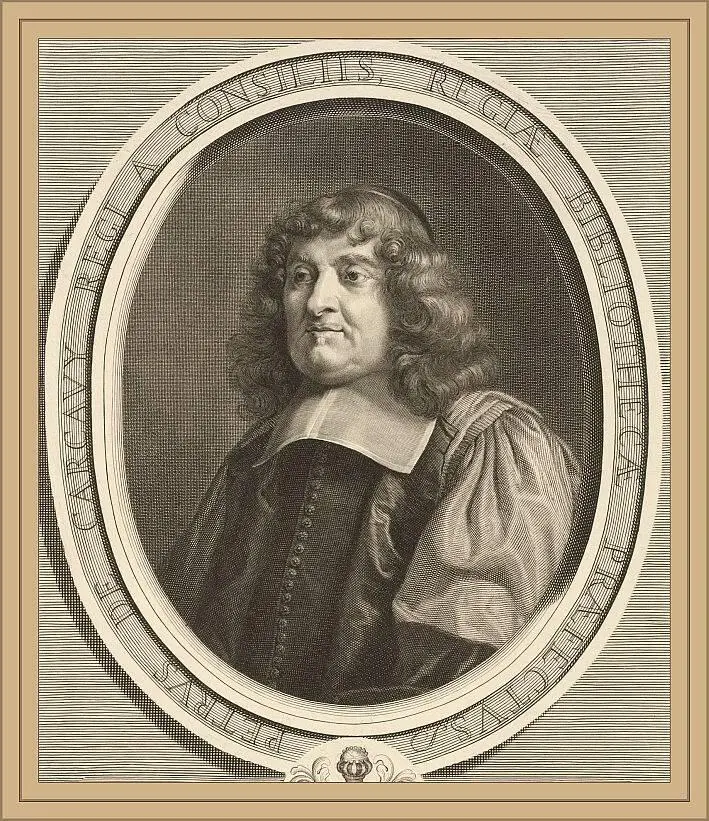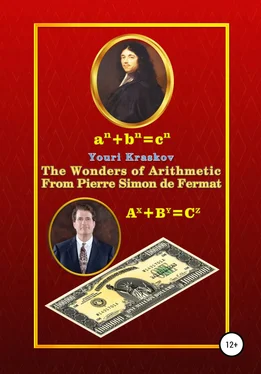1 ...7 8 9 11 12 13 ...34 But paradoxically in this life drama is distinctly seen a truly divine providence having lay a special mission to Senator Pierre de Fermat aimed at saving science from destruction. At that early age the science was still seemed as a beautiful tree, which by growing became more and more valuable and attractive. But with the development of science the features of perfection and harmony inherent in it, began to fade and the image of the beautiful creation of the mind more and more resembled a helpless little freak.
Pic. 11. Pierre de Carcavy

These first signs of trouble were noticed else by Fermat since controversies in his correspondence with colleagues appeared almost on empty place. It became clear that this tree has almost no roots. This means that science does not have a sufficiently strong foundation and for it there is a threat of the fate of the Pisa Tower. Then, in order for this magnificent building of science to serve its intended purpose, all creative forces will have to be used not for development, but for preventing its complete collapse.
For Fermat this theme was going past the limits of his physical possibilities and he considered it only from the point of view of generalizing methods for solving various arithmetic problems. It is so, because arithmetic is not some separate science, but the basis for all other sciences. If we have no arithmetic, then we have no any science generally. In this sense, the arithmetic tasks proposed by Fermat are of peculiar importance. Their peculiarity is that they teach people to think in general categories i.e. to find methods regulating the possibilities of computations for solving a wide range of tasks.
And here is an amazing paradox. About Diophantus who gave solutions to nearly two hundred completely not simple arithmetic tasks, now, if anyone remembers of him, then only in connection with the name of Fermat. But about Fermat himself, who did not leave any single (!!!) proof of his theorems, 5 5 It is believed that Fermat left only one proof [36], but this is not entirely true since in reality it is just a verbal description of the descent method for a specific problem (see Appendix II).
all and sundry are constantly discussing for the fourth century in a row! Very few of those who were able to solve although one Fermat’s tasks, secured for themselves world-wide fame, but countless number of people who suffered fiasco, cannot find for this any rational explanation and they have no other choice, but only simply to ignore this very fact.
But how could such an amazing phenomenon appear in the history of science when a man, who was not even a professional scientist, became so famous? To see here only an accidental combination of circumstances, would be clearly unwise. It is much more logical to proceed from the fact that at some stage in his life, Fermat began to realize that if his plans for publishing his research were carried out, the fate of Diophantus, which was already then almost forgotten, awaits him at best. If about Fermat anyone will also remember, then only against the background of derogatory and even caricature opinions of the “experts”.
In fact, it is all happened just so, but the effect was the opposite. No one could have imagined that thanks to Fermat a fascination with mathematics would take on such a mass character. The more his opponents sought to belittle him, the more popular his name became. Even the feats of D'Artagnan, which were fictional by A. Dumas, were simply childish pranks compared to what his fellow countryman Toulousean Senator Pierre de Fermat did in reality. And yet, how could this provincial judicial official be able to achieve such an amazing result?
It is very simple since he was a lawyer, he did everything exclusively and only legally, therefore he has left to himself all the works, in which his opponents could see recordings of “heretical content”. In addition, he was not only an outstanding mind with a lot of life experience, but also a Gascon. And it is well known that people of this type even the very serious doings can present in such an unpretentious and humorous wrapper: Yes, sometimes I'm reading Diophantus' “Arithmetic” at leisure and made notes with some ideas following the example of the esteemed and Right Honorable Claude Bachet who performed not only the Latin translation during the preparation of this book in 1621, but also added his own remarks.
Fermat did exactly the same i.e. had prepared for publication, as if were not his own works, but the same “Arithmetic” of Diophantus (see Pic. 96 in Appendix VI) with the same remarks of Bachet and has added to them the 48 his remarks. Everything was prepared so that any claims to this book or to him the Honorable Senator Pierre de Fermat simply could not be. But when the book was published, then unlike its previous editions, it stirred up the entire scientific world! Those comments made allegedly in passing on the margins of Diophantus’ book, turned out to be so valuable that they allowed scientists to develop science very noticeably using Fermat's new ideas for hundreds of years! And everything would be just perfect if it were not this his Last Theorem not amenable to any comprehension in scientific circles.
It would seem, what might be unusual here? Such unresolved problems in science are simply cannot be counted. But the fact of the matter is that the author of the theorem himself announced that he had the "truly amazing proof", but science cannot get although any for 350 years!!! It is only in the mass consciousness the author of the theorem is a real triumphant, but for science it’s like a bone in the throat. Here are already present obvious signs of illness. What kind of science is this, which for hundreds of years cannot to solve the school task? It would be OK if only one this task, but science cannot also recognize the obvious fact that it does not have the basic knowledge necessary for this, which Fermat discovered yet in those distant times.
Science lost not only the ability to comprehend, but also to orient in the events around it. How is it so that we have no knowledge, there are a whole mountain of them! This is for sure, “knowledge” was accumulated so many that to understand and assimilate all this wealth has become beyond human strength and capabilities. But in fact, everything is just the opposite. There is a very noticeable lack of real knowledge and the most part of all what has been accumulated, is empty grinding of many problems, which either have no solutions at all or else worse when dubious ideas are taken as the initial ones, on which mind-blowing theories are built, what naturally generating all sorts of paradoxes and contradictions. Then scientists are trying with all their might to overcome them, but for some reason if something work sout for them that only with the help of even more mind-blowing theories.
Such an unusual character of our perceptions concerning to science, can cause a very negative reaction. But here we can confess that we had very good reasons for this because we managed to look in those very “heretical recordings” of Fermat. For greater persuasiveness we directly here will show one of the examples of our capabilities and accurately reproduce the real text of the most intriguing recording of the Fermat's Last theorem in the margins of Diophantus' "Arithmetic", which instance did belong to the author and disappeared unknown whither. So, in this place (see Pic. 5), we gain sight of several notes to the task under the number VIII made in Latin at different times. In translation they look like this:
1st entry: However, it is impossible to decompose C into two other C or QQ into two other QQ. Both proof by the descent method .
Читать дальше






![Theresa Cheung - The Dream Dictionary from A to Z [Revised edition] - The Ultimate A–Z to Interpret the Secrets of Your Dreams](/books/692092/theresa-cheung-the-dream-dictionary-from-a-to-z-r-thumb.webp)






